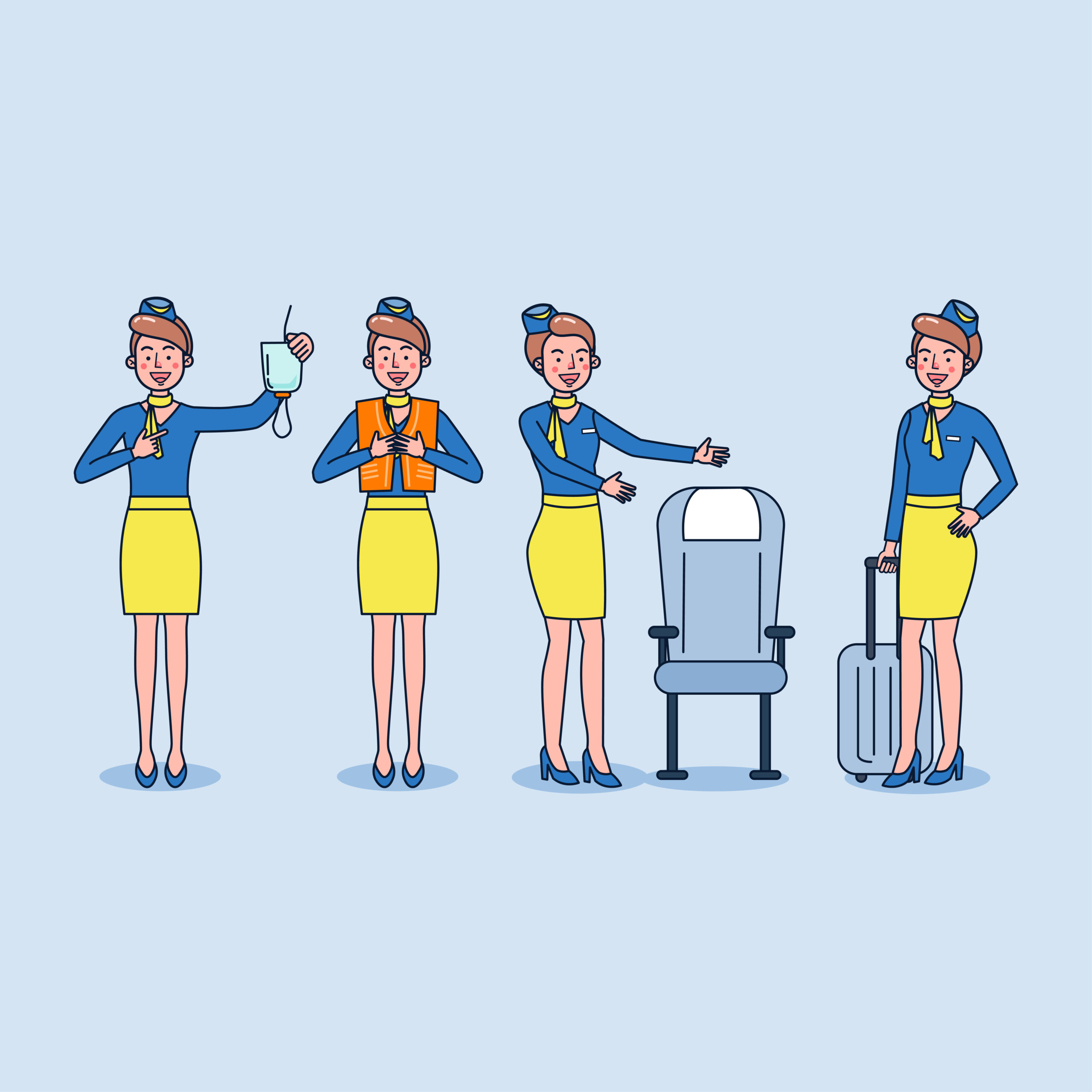Table of Contents
Introduction
Are you fascinated by the idea of soaring through the clouds, providing impeccable service at 30,000 feet, and exploring new horizons? Pursuing a career as an air hostess might be the perfect path for you. In this comprehensive guide, we’ll navigate through the essentials of kickstarting a career as an air hostess after completing your 10th-grade education.
Becoming an Air Hostess is not just a job; it’s a lifestyle choice that involves travel, meeting diverse people, and ensuring the safety and comfort of passengers.
Educational Requirements After 10th Grade
After completing your 10th-grade education, the path to becoming an Air Hostess opens up. However, the right educational background plays a pivotal role in shaping your journey.
While airlines generally require candidates to have completed at least their 10th-grade education, having a higher educational qualification can enhance your prospects. Airlines often prefer candidates with a background in arts, commerce, or science.
Key Subjects for Aspiring Air Hostesses
English Proficiency
English proficiency is paramount in the aviation industry. Aspiring Air Hostesses should focus on sharpening their language skills to ensure effective communication with passengers and crew.
Being fluent in English is not only a requirement but a skill that significantly contributes to the quality of service provided. This includes clear announcements, effective communication during emergencies, and making passengers feel at ease.
Communication Skills
Beyond language proficiency, strong communication skills are essential. The role of an Air Hostess involves interacting with passengers, fellow crew members, and ground staff. Therefore, the ability to convey information clearly and concisely is a hallmark of a successful Air Hostess.
Training in effective communication, including non-verbal cues and active listening, is often included in the curriculum of aviation institutes.
Personality Development
Cultivating a vibrant and approachable personality is key. Airlines often seek individuals with a positive attitude and the ability to handle challenging situations with grace.
Personality development programs may cover aspects like confidence-building, emotional intelligence, and stress management, preparing aspiring Air Hostesses for the varied situations they may encounter.
Criteria for Aspiring Air Hostesses
Age and Gender Considerations
Airlines typically have specific age and gender criteria for Air Hostess positions. It’s essential to be aware of these requirements before pursuing a career in this field.
Age requirements vary, but candidates are generally expected to be between 18 and 26 years old. Some airlines may have flexibility in age criteria, but it’s crucial to check the specific requirements of the airline you’re interested in.
Physical Fitness
Being in good physical condition is a non-negotiable aspect of the job. Airlines prioritize candidates who can meet the physical demands of the profession.
Physical fitness tests may include assessments of endurance, flexibility, and overall health. It’s advisable for aspiring Air Hostesses to maintain a regular fitness routine to meet these requirements.
Training Programs and Certifications
Aviation Institutes
Enrolling in reputable aviation institutes is a crucial step. These institutes offer comprehensive training programs covering everything from safety procedures to customer service.
Choosing the right institute is crucial for acquiring the necessary skills and knowledge. Look for institutes with affiliations to aviation regulatory bodies and a track record of producing successful professionals.
Duration and Curriculum
The duration of training programs varies, but they generally cover a broad curriculum, including emergency protocols, first aid, and in-flight service etiquette.
Training programs aim to equip Air Hostesses with the skills needed to handle various situations confidently. The curriculum typically includes theoretical and practical components, ensuring a well-rounded education.
Height and Appearance Standards
The Role of Physical Attributes
Airlines often have height requirements for Air Hostesses, emphasizing the importance of a uniform appearance in maintaining a professional image.
While specific height requirements vary between airlines, candidates are generally expected to have a height that allows them to reach overhead compartments and perform duties efficiently. However, exceptions may be made based on other qualifications and skills.
Grooming and Dress Code
Grooming standards are high, and adhering to a specific dress code is essential. Air Hostesses are the face of the airline, and a polished appearance is a part of the job.
Grooming guidelines cover aspects such as hairstyles, makeup, and uniform presentation. Airlines often provide detailed guidelines to ensure a consistent and professional appearance across their staff.
Language Proficiency and Multicultural Sensitivity
Importance of Multilingual Skills
As the aviation industry caters to a diverse global audience, knowing multiple languages can be really helpful. Air Hostesses who can communicate in multiple languages have a distinct edge.
Speaking more than one language makes the customer service experience better, especially on international flights. While not mandatory, candidates with proficiency in languages commonly spoken in aviation hubs may find themselves in higher demand.
Onboard Duties and Responsibilities
Passenger Safety and Emergency Procedures
Air Hostesses play a crucial role in ensuring passenger safety. They are trained to handle emergency situations and implement safety protocols with precision.
Training in emergency procedures is a fundamental aspect of an Air Hostess’s education. This includes familiarization with safety equipment, evacuation drills, and coordination with the flight crew during emergencies.
In-Flight Customer Service
Delivering exceptional customer service is a daily responsibility. Air Hostesses strive to make passengers’ journeys comfortable and enjoyable.
Customer service training covers various aspects, including handling passenger requests, serving meals, and addressing inquiries. The goal is to create a positive and welcoming atmosphere throughout the flight.
Interview Process and Selection Criteria
Group Discussions and Personal Interviews
The selection process often involves group discussions and personal interviews. Airlines assess candidates not only for their technical knowledge but also for their interpersonal skills.
Group discussions test candidates’ ability to communicate effectively in a team setting, while personal interviews delve into their motivations, problem-solving skills, and attitudes. Aspiring Air Hostesses should prepare for these aspects of the selection process.
Assessment of Soft Skills
Soft skills, including teamwork, problem-solving, and adaptability, are highly valued. Candidates who can demonstrate these qualities stand out during the selection process.
Soft skills contribute to creating a positive and harmonious working environment onboard. As Air Hostesses often work in close-knit teams, interpersonal skills are crucial for effective collaboration.
Career Advancement Opportunities
Senior Cabin Crew Positions
After gaining experience, Air Hostesses can progress to senior cabin crew positions, taking on additional responsibilities and leadership roles.
Senior cabin crew members often act as mentors to junior staff, coordinate in-flight operations, and assist in the training of new recruits. Advancement opportunities reward experienced Air Hostesses for their dedication and expertise.
Transition to Ground Staff
Some Air Hostesses choose to transition to ground staff roles, contributing to various aspects of airline operations.
Transitioning to ground staff allows individuals to apply their skills and experience in roles such as customer service, ground operations, or training. This diversification of roles keeps the career trajectory dynamic and provides a broader perspective on the aviation industry.
Challenges and Rewards in the Air Hostess Profession
Coping with Jet Lag and Irregular Schedules
While the profession offers excitement, dealing with jet lag and irregular schedules can be challenging. Air Hostesses need to adapt to different time zones and working hours.
Managing irregular schedules requires effective time management and self-care strategies. Air Hostesses often develop routines that help them adjust to different time zones and mitigate the impact of irregular working hours on their health.
Fulfilling Interpersonal Experiences
On the flip side, the profession provides fulfilling interpersonal experiences, allowing Air Hostesses to connect with people from diverse backgrounds.
Building connections with passengers and experiencing different cultures are some of the rewarding aspects of the job. Air Hostesses often share stories of the friendships formed during flights and the joy of making travel a memorable experience for passengers.
Salary and Benefits
Competitive Salaries and Perks
Air Hostesses enjoy competitive salaries, often accompanied by additional perks such as travel allowances and health benefits.
Salaries vary based on factors like experience, airline size, and the routes flown. Additionally, many airlines offer bonuses, allowances, and discounts on personal travel, adding to the overall compensation package.
Health and Insurance Benefits
Airlines prioritize the well-being of their staff, offering comprehensive health and insurance benefits to ensure their physical and mental health.
Health and insurance benefits cover a range of medical expenses and provide financial security. Air Hostesses can focus on their jobs with peace of mind, knowing that their well-being is a priority for their employers.
Global Opportunities and Travel Perks
Exploring the World through Work
One of the perks of the job is the opportunity to explore different destinations. Air Hostesses can satisfy their wanderlust while pursuing their careers.
International flights expose Air Hostesses to diverse cultures and experiences. Exploring new cities during layovers and having the chance to interact with people worldwide add an exciting dimension to the profession.
Balancing Work and Personal Life
Maintaining a Healthy Work-Life Balance
Balancing the demands of the profession with personal life is crucial. Successful Air Hostesses find ways to maintain a healthy work-life balance.
The irregular schedules and time away from home can pose challenges, but effective time management, self-care practices, and a supportive network contribute to a fulfilling work-life balance.
Conclusion
In conclusion, pursuing a career as an Air Hostess requires a combination of education, training, and personal attributes. The profession offers a unique blend of challenges and rewards, making it a fulfilling choice for those with a passion for aviation and customer service.
FAQs
- What are the educational requirements to become an Air Hostess?
- Airlines generally require candidates to have completed their 10th-grade education as a minimum requirement.
- Are there specific subjects that aspiring Air Hostesses should focus on?
- While there are no specific subjects, emphasis on English proficiency, communication skills, and personality development is crucial.
- Is there an age limit for becoming an Air Hostess?
- Airlines often have age criteria, and candidates need to be within a specified age range to be eligible.
- What kind of physical fitness is required for the profession?
- Good overall physical fitness is essential, as Air Hostesses need to meet the demands of the job, including emergency situations.
- Can Air Hostesses advance in their careers?
- Yes, experienced Air Hostesses can progress to senior cabin crew positions or transition to ground staff roles within the airline industry.
For more courses and in-depth information, you can visit our Courses Page and explore other options.


Leave a Reply